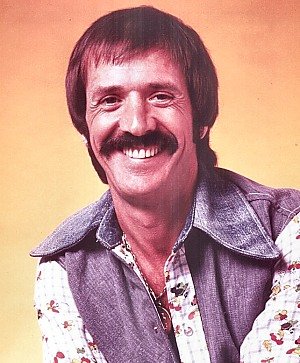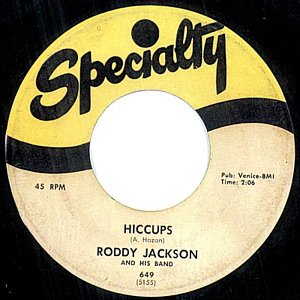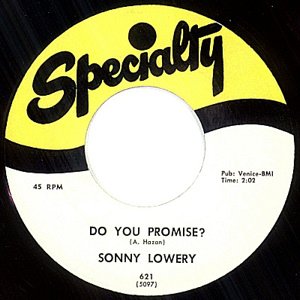|
 [ BACK TO AL HAZAN HOME PAGE ] [ BACK TO AL HAZAN HOME PAGE ]
 Sonny Bono Produces Al's Early Songs HEAR Sonny Bono Produces Al's Early Songs HEAR
It was the middle of winter, on a rainy afternoon in 1957, that I first met Sonny Bono. He was working as A&R man for Specialty Records, located near the corner of Sunset and La Cienega in West Hollywood. I was just beginning to feel confident about calling smaller record companies directly, without the help of a publisher.
I called Specialty Records to ask for an appointment and was surprised to hear Sonny's distinctively friendly voice answer the phone directly. Usually a receptionist answered the phones formally at most record companies. Not on this occasion, however.
I asked Sonny about getting together and he said he'd be happy to meet and was looking for new material. He also informed me he had two recording sessions coming up. One of the sessions was a male country singer and the other was a new singer with a strong rock and roll voice. I was impressed with Sonny's easy manner over the phone and we made an appointment to get together the next day.
When I arrived, Sonny was sitting in a small dimly-lit office, in what seemed to be the basement. In that tiny space there was nothing more than a few chairs, a desk spread full of 45 rpm records and a dusty old upright piano against the wall. After exchanging salutations, I sat at the piano and sang a few of my most recent songs for him.
Some of the notes weren't working on that old upright, but I just kept on playing. One of the songs was called "Hiccups" and the other two were "Do You Promise" and "I Think of You." Sonny, a talented writer himself, was very complimentary after hearing them.
 He ended up producing two of the three songs. A young singer named Sonny Lowery performed "Do You Promise," a country-style love song. "Hiccups," a novelty song, was performed by a new singer named Roddy Jackson. "Hiccups" was very successful as an upbeat rock and roll record and still gets played in many countries. These songs were among my first records and were especially important to me. He ended up producing two of the three songs. A young singer named Sonny Lowery performed "Do You Promise," a country-style love song. "Hiccups," a novelty song, was performed by a new singer named Roddy Jackson. "Hiccups" was very successful as an upbeat rock and roll record and still gets played in many countries. These songs were among my first records and were especially important to me.
Sonny and I would talk about the record business for hours, in that basement at Specialty, and we became good friends. He was very encouraging to me as a writer, which I appreciated because I respected his opinion. I felt I could be totally honest with him because of his obvious sincerity. We could talk about anything and we would often complain about the music business and some of the low life people we didn't care for.
Sonny had a very individual taste in clothes and wore his hair like a Roman gladiator, in a kind of bowl cut. At the time I thought it looked a little strange but then the Beatles came along with the same hairstyle and made it popular.
Sonny never got a chance to record "I Think of You", which was his favorite song of mine, because he got fired from Specialty Records before he had a chance. I never asked him why he got fired, but I knew he was talented and would succeed in the business one way or another. We went our separate ways after he left Specialty Records, until we reunited a couple years later.
 A couple years later, after the Army, I phoned Sonny and we started hanging out together again. One afternoon, in the Spring of 1962, we were just sitting around the piano at my parent's home, and Sonny was playing the beginning of a song he was trying to finish. The song was titled "Cheatin' on Me." Sonny had come up with the title and some lyrics, but somewhere along the way got stuck and asked me to help him finish it. A couple years later, after the Army, I phoned Sonny and we started hanging out together again. One afternoon, in the Spring of 1962, we were just sitting around the piano at my parent's home, and Sonny was playing the beginning of a song he was trying to finish. The song was titled "Cheatin' on Me." Sonny had come up with the title and some lyrics, but somewhere along the way got stuck and asked me to help him finish it.
I sat at the piano while Sonny looked on and in a couple of hours we completed the music and lyrics and we both agreed the song turned out pretty well. Since Sonny had another song written he wanted to record, we thought it would be fun to co-produce the two songs together. A few days later, he introduced me to Lester Sill, a well-known music businessman. We played him the two songs, and because Mr. Sill trusted Sonny's judgment and reputation as a producer, he agreed to finance our session.
Sonny had a singer he thought was talented, name of Willie Gibson, whom he had heard performing in a nightclub. I was happy to let Willie do the vocal for our song. The arranger we hired for that particular date was a talented musician named Gene Page, who I had heard of but had never worked with before. It was Sonny's idea to use Gene Page since they had worked together on another production Sonny did. There were so many talented arrangers and musicians available in those days, it really made a producer's job easy.
We showed up at the recording studio in the middle of a smoggy Thursday afternoon around two weeks later. I was impressed to hear the arrangement Gene wrote as he rehearsed the musicians and smiled my approval over at Sonny. Gene had written an exciting background for our song that featured horns and backup voices, which complimented Willie Gibson's voice perfectly. Of course, he had heard Willie on the demonstration record Sonny had made. Sonny and I were really starting to get very pumped up about our first production together.
We recorded the basic rhythm tracks for both songs and then added the horn section over that. Except for a little trouble positioning the mic on the drums, most of the musical part of the recording went pretty smoothly. We excused all the musicians after paying and thanking them for their efforts, but I asked Gene Page to hang around. I wanted Gene to be there while we had the backup singers do their part, to make sure it was right.
 Lastly, we put Willie Gibson behind a screen with a pair of earphones so he could hear the prerecorded music while singing his vocal. After completing the vocal on "Cheatin' on Me", which took about twenty minutes and six takes, I just sat back and enjoyed listening to Willie perform the song Sonny wrote for the back side, "Baby Boy." Sonny had to sing some parts to Willie to get the interpretation right, but the entire session was completed within the three hours studio time we had booked. As I recall, Lester Sill made sure to remind us to do so. Lastly, we put Willie Gibson behind a screen with a pair of earphones so he could hear the prerecorded music while singing his vocal. After completing the vocal on "Cheatin' on Me", which took about twenty minutes and six takes, I just sat back and enjoyed listening to Willie perform the song Sonny wrote for the back side, "Baby Boy." Sonny had to sing some parts to Willie to get the interpretation right, but the entire session was completed within the three hours studio time we had booked. As I recall, Lester Sill made sure to remind us to do so.
"Cheatin' on Me" by Willie Gibson was the only session Sonny and I co-wrote and co-produced. Sonny had to use the name Sonny Christie as the writer credit on this song since I was a BMI writer and that was the name he used for BMI. Back then, co-writers were supposed to be associated with the same royalty agency. Sonny used his real name, Salvatore Bono, when he wrote for ASCAP. Belonging to both BMI and ASCAP was not allowed; it was a technicality that had to do with royalty distribution. But some writers found ways to belong to both, just in case.
BMI and ASCAP are agencies that collect royalties for their songwriters whenever songs are performed. Every time a song is played on the radio or television, for instance, the station is supposed to log that fact and pay a small royalty to BMI or ASCAP. These agencies then take a small percentage for expenses and distribute the rest of the royalties; half to the publisher and half directly to the songwriter. Royalties from the sale of mechanical copies (records, tapes, CDs) are collected differently. First the retail store pays the distributor who then pays the record company who then distributes the royalty to the publisher who in turn is supposed to send the songwriter(s) their half (or whatever amount has been agreed to).
Sonny and I worked well as a team because we felt comfortable together, personally and musically. As for the musicians, the drummer was Sharky Hall. I'm pretty sure I hired Ray Pullman or Carol Kaye on Fender Bass and I definitely had Glen Campbell on guitar. I can't remember where in Hollywood the session was done but I know it wasn't produced at Gold Star for some reason. Maybe Lester Sill had a special deal at this particular studio, but that didn't matter to us. We were happy to be given the money to record our song and we would have been glad to produce it anywhere.
Sometimes a businessman like Mr. Sill would offer the owner of a recording studio a small percentage of potential royalties, instead of actual monetary payment, to keep his expenses down. Since Mr. Sill had a reputation for being successful, it wasn't hard for him to work such deals. The usual amount paid to the studio in such a case would be between one-half to one cent per record sold. Sometimes a recording studio could make more on one of those deals, if the record was a hit, then they might make the rest of the year renting studio time.
Although "Cheatin' On Me" was released on Warner Brothers Records in 1962, nothing happened with it. Like many records released back then, few got radio air play. The main thing I remember about the session is how much fun I had being in the booth with Sonny and what a really good time we had doing it.
A few months later, I tried recording Sonny as a vocalist at Gold Star. I had this particular background arrangement I had recorded previously while I was the A&R man at Ava Records. The song was called "I'll Change" and had been recorded by Dick Stewart but was never released. I thought it might be fun to hear how Sonny's voice would sound over the background tape I kept. I figured maybe I could use this as a demonstration record to sell him as an artist.
Although I hadn't written the song, I liked it enough to have produced it and I thought it might fit Sonny's voice. Sonny really liked to sing, although I don't think he thought his voice was anything exceptional. However, I remember Jack Nitzsche telling me he saw Sonny do some singing on stage one night and was surprised to see how well he did as a performer.
Anyway, we rehearsed the song awhile before doing a few recorded takes on the vocal, but I wasn't very impressed. Stan Ross, the owner of Gold Star who was kind enough to let use the studio for free, liked Sonny's natural style more than I did and thought he could be commercial as an artist. He thought Sonny had a pleasantly intimate sound that probably would probably be appealing to many people. Maybe I should have paid more attention to Stan's opinion that night.
It wasn't longer than three months after that night when Sonny teamed up with Cher and went on to create music and television history. The "Sonny and Cher Comedy Hour" was one of the most successful television shows of the 1970s and Sonny was a big star. Unfortunately, after Sonny became a successful performer, we seldom got together. I never did meet Cher because they were so busy with their career.
But a couple years after their divorce Sonny invited me to have dinner with him and his new wife, Mary, at his restaurant in Palm Springs. We talked about the music business and some about Jack Nitzsche breaking up with a singer he had been seeing. Sonny also mentioned how much he preferred living in Palm Springs rather than Los Angeles. That was the last time we spent an evening together.
As you probably know, Sonny became mayor of that fair city and eventually went on to Washington D.C. as a United States Congressman. He was quite a special guy and it was a great tragedy when he died in a skiing accident on the snowy slopes of the California Sierras. I sometimes wish I could remember what happened with that session tape because it would be a treasured memory for me as well as a collector's item.
[MORE ABOUT CAROL KAYE]
[MORE ABOUT GLEN CAMPBELL]
|